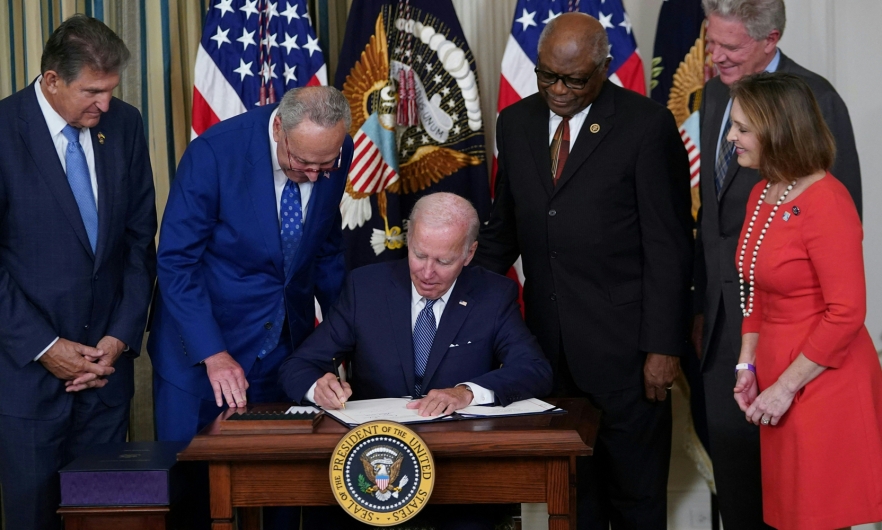Biden's Public Health Wins
Biden made his mark on public health with policies designed to protect Americans from hazardous chemicals, reduce drug prices, expand insurance coverage, and more.

Mandel Ngan/AFP via Getty
From the beginning, President Bidenʼs administration faced major public health challenges: the COVID pandemic, spiraling health care and prescription costs, the overturning of Roe v. Wade, a worsening climate crisis, the ongoing opioid epidemic, and more.
In response, the Biden administration made significant, and sometimes historic, impacts in several key areas, including advancing environmental justice, shoring up reproductive health rights, promoting gun safety, expanding health insurance coverage, and cutting the spiraling cost of prescription drugs.
Here are some of the administration’s biggest wins.
Reducing Exposures to Hazardous Chemicals
Lead
Some 9 million U.S. homes get water through legacy lead pipes. Under Biden, the EPA moved to require all U.S. cities to replace these pipes in households within the next decade to reduce lead exposure from drinking water, which can cause developmental delays and other lifelong health effects for children.
Biden also cracked down on lead paint, declaring any amount of lead dust detected on the floors and windowsills of U.S. homes hazardous. Thirty one million housing units—more than a third of all homes in the U.S.—still contain lead-based paint, which was banned in 1978.
Asbestos
One of the big wins of Bidenʼs Cancer Moonshot project was definitive action to ban the use of chrysotile asbestos, the only form of the dangerous chemical still used in the U.S. The EPA regulation is the first significant federal action in decades. The EPA banned asbestos in 1989, but the rule was largely overturned in a 1991 court decision.
The chemical, used in items like roofing materials, textiles, and various automotive parts, is linked to lung cancer and mesothelioma. It is already banned in 50 other countries.
The administration also established new standards to reduce forever chemicals in Americansʼ drinking water.
Protecting Vulnerable Communities
The administration focused on reducing environmental health disparities, and these efforts “ provided communities with infrastructure funds to strengthen resilience to extreme climate events,” says Thomas Burke, PhD, MPH, emeritus professor in Health Policy and Management.
Written into the Inflation Reduction Act, EPA Community Change Grants are the single largest investment in environmental justice going directly to communities in history, distributing $2 billion to projects that deploy clean energy, strengthen climate resilience, and help communities tackle environmental and climate justice challenges.
Although environmental justice seems to be in the crosshairs of the incoming administration, the Biden administration has already distributed tens of millions of dollars to address the unequal burdens of pollution.
Shoring Up Abortion Access Post-Roe
Under Biden, the FDA issued new rules allowing retail pharmacies to dispense the abortion medication mifepristone to those with a prescription, and allowing them to be delivered by mail. Previously, these pills had to be ordered, prescribed, and dispensed by a certified health care provider.
After Roe v. Wade was overturned by the Supreme Court, the Biden administration reminded ER doctors of their obligation to perform emergency abortions when necessary to save a pregnant woman’s health under Emergency Medical Treatment and Labor Act (EMTALA.)
“The Biden administration’s guidance on EMTALA was a public health win, but it is likely to go away when Trump takes office,” says Joanne Rosen, JD, MA, a practice professor in Health Policy and Management who studies the impact of the law and policy on sexual and reproductive health rights.
Bidenʼs progress on reproductive rights faces significant future headwinds by SCOTUS: Two separate 2024 rulings seemed to leave the door open for future litigation that could endanger future access to mifepristone and challenge the legality of EMTALA.
Historic Gun Safety Legislation
Biden signed into law the first major federal gun safety legislation in nearly 30 years with bipartisan support—a major win on one of the countryʼs thorniest policy issues.
The bipartisan bill includes incentives for states to pass Extreme Risk Protection Orders, or red flag laws, that allow groups to petition courts to remove weapons from people deemed a threat to themselves or others.
The bill also expands background checks on people ages 18–21 seeking to buy a gun and broadens a law that prevents dating partners—not just spouses and former spouses—convicted of domestic abuse from owning a gun.
Cutting the Cost of Prescription Drugs
Americans pay the highest prescription drug prices in the world, “which was one of the major challenges the American public faced at the beginning of the Biden administration,” says Gerard F. Anderson, PhD, a professor in Health Policy and Management. “The Inflation Reduction Act had four very important components that lowered drug prices now and will into the future,” he says. They include:
- Empowering Medicare, for the first time, to negotiate prices for certain medicines. In August, the administration announced it had reached agreements for new, lower prices for 10 high-cost drugs, including best-selling medicines for heart disease, diabetes, and cancer.
- Establishing a $2,000 cap on out-of-pocket drug costs for Medicare beneficiaries starting in 2025.
- Capping the price of insulin at $35 for Medicare beneficiaries.
- Establishing penalties for drug companies that increase prices above the rate of inflation.
Expanding Access to Care
Enrollment in the Affordable Care Act increased every year of the Biden administration and reached a record 24 million enrollees for 2025. The enrollment spike helped cut the uninsured rate from 14.5% to 11%.
The administration increased ACA subsidies under the American Rescue Plan in 2021 and extended them through 2025 under the Inflation Reduction Act, meaning more Americans can get discounted health insurance under the program.
The subsidies have also cut premiums for eligible enrollees by 44%, or $705 annually, according to KFF. These subsidies will expire at the end of next year unless Congress extends them.
Addressing the Opioid Crisis
The Biden administration helped to extend existing rules permitting eased access to the opioid addiction treatments buprenorphine and methadone via telemedicine. Biden also signed legislation in December 2022 making it easier to prescribe buprenorphine by removing a requirement that doctors apply for a waiver.
The administration has worked to make the opioid overdose reversal drug naloxone available in more places, such as federal facilities and schools, and paved the way for over-the-counter sales of naloxone nasal spray.
What’s Next?
Many of Biden’s wins may face challenges from the next administration, including from the conservative judiciary that is the legacy of Trump’s first term. It will be up to public health advocates to remember the impacts of these wins to help inform future efforts to improve Americans’ health.
Annalies Winny is a writer and producer at the Johns Hopkins Bloomberg School of Public Health.




